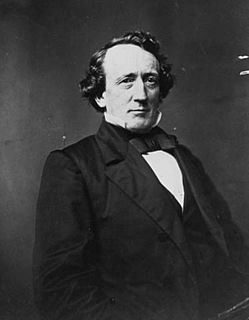
Henry Mower Rice was a fur trader and an American politician prominent in the statehood of Minnesota.
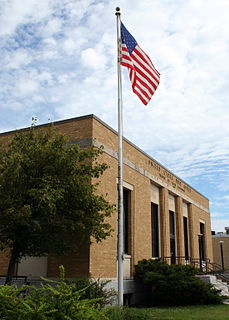
Prairie du Chien is a city in and the county seat of Crawford County, Wisconsin, United States. The population was 5,911 at the 2010 census. Its ZIP Code is 53821.

Fort Crawford was an outpost of the United States Army located in Prairie du Chien, Wisconsin, during the 19th century.
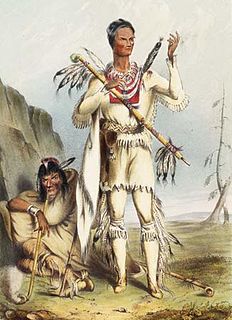
The Winnebago War, also known as the Winnebago Uprising, was a brief conflict that took place in 1827 in the Upper Mississippi River region of the United States, primarily in what is now the state of Wisconsin. Not quite a war, the hostilities were limited to a few attacks on American civilians by a portion of the Winnebago Native American tribe. The Ho-Chunks were reacting to a wave of lead miners trespassing on their lands, and to false rumors that the United States had sent two Ho-Chunk prisoners to a rival tribe for execution.
The Treaty of Fond du Lac may refer to either of two treaties made and signed in Duluth, Minnesota between the United States and the Ojibwe (Chippewa) Native American peoples.
Treaty of Prairie du Chien may refer to any of four treaties signed in Prairie du Chien, Wisconsin by the United States and Native American peoples of the Upper Midwest:

The Siege of Prairie du Chien was a British victory in the far western theater of the War of 1812. During the war, Prairie du Chien was a small frontier settlement with residents loyal to both American and British causes. By 1814, both nations were anxious to control the site because of its importance to the fur trade and its strategic location at the intersection of the Mississippi River and the Fox-Wisconsin Waterway, a transportation route linking the Mississippi with the Great Lakes.
Treaty of St. Peters may be one of two treaties conducted between the United States and Native American peoples, conducted at the confluence of the Minnesota River with the Mississippi River, in what today is Mendota, Minnesota.

Colonel Henry Gratiot was a French-American pioneer, farmer, and mill owner. During the Winnebago and Black Hawk Wars, he acted as both an intermediary and early U.S. Indian agent to the Winnebagos throughout the early 19th century. He and his brother Jean Pierre were among the first pioneers to settle in Wisconsin, operating a successful lead mining and lead smelting business, during the 1820s and 1830s. Both, the present-day village of Gratiot, Wisconsin and the town of Gratiot (town), Wisconsin are named in his honor.
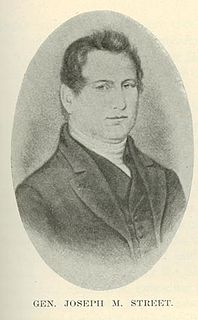
General Joseph Montfort Street was a 19th-century American pioneer, trader and US Army officer. During the 1820s and 1830s, he was also a U.S. Indian Agent to the Winnebago and later to the Sauk and Fox tribes after the Black Hawk War. His eldest son was Joseph H. D. Street, the first appointed registrar of the Council Bluffs Land Office in western Iowa.

Nicholas Boilvin (1761–1827) was a 19th-century American frontiersman, fur trader, and U.S. Indian Agent. He was the first appointed agent to the Winnebagos, as well as the Sauk and Fox, and one of the earliest pioneers to settle in present-day Prairie du Chien, Wisconsin. His sons Nicholas Boilvin, Jr. and William C. Boilvin both became successful businessmen in Wisconsin during the mid- to late 19th century.

Wabasha II, also known as Wapahasha, Wapasha, or "The Leaf," succeeded his father as head chief of the Mdewakanton Dakota tribe in the early 1800s. He led the Dakota forces fighting with the British in the War of 1812, but sided with the United States in the Black Hawk War of 1832. Chief Wabasha II signed the Treaties of Prairie du Chien in 1825 and 1830.

The Treaty of Prairie du Chien may refer to any of several treaties made and signed in Prairie du Chien, Wisconsin between the United States, representatives from the Sioux, Sac and Fox, Menominee, Ioway, Winnebago and the Anishinaabeg Native American peoples.

The Treaty of Prairie du Chien may refer to any of several treaties made and signed in Prairie du Chien, Wisconsin between the United States, representatives from the Sioux, Sac and Fox, Menominee, Ioway, Winnebago and the Anishinaabeg Native American peoples.
The fourth Treaty of Prairie du Chien was negotiated between the United States and the Sac and Fox, the Mdewakanton, Wahpekute and Sisseton Sioux, Omaha, Ioway, Otoe and Missouria tribes. The treaty was signed on July 15, 1830, with William Clark and Willoughby Morgan representing the United States. Through additional negotiations conducted in St. Louis on October 13, 1830, Yankton Sioux and Santee Sioux agreed to abide by the 1830 Treaty of Prairie du Chien. The US government announced the treaty and its numerous adherents on February 24, 1831.
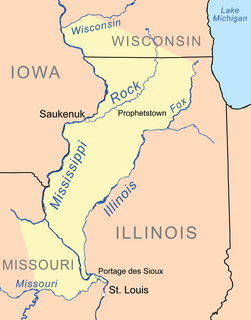
The Treaty of St. Louis is the name of a series of treaties signed between the United States and various Native American tribes from 1804 through 1824. The fourteen treaties were all signed in the St. Louis, Missouri area.
The Treaty of St. Louis is the name of a series of treaties signed between the United States and various Native American tribes from 1804 through 1824. The fourteen treaties were all signed in the St. Louis, Missouri area.
The Treaty of St. Louis is the name of a series of treaties signed between the United States and various Native American tribes from 1804 through 1824. The fourteen treaties were all signed in the St. Louis, Missouri area.
The Treaty of St. Louis is the name of a series of treaties signed between the United States and various Native American tribes from 1804 through 1824. The fourteen treaties were all signed in the St. Louis, Missouri area.

Zhaagobe (c.1794), also known as Jack-O-Pa or Shagobai, was a St. Croix Ojibwe chief of the Snake River band. He signed several Chippewa treaties with the United States, including the 1825 Treaty of Prairie du Chien, the 1826 Treaty of Fond du Lac, the 1837 Treaty of St. Peters, and the 1842 Treaty of La Pointe. In 1836, geographer Joseph Nicollet had an Ojibwe guide he called Chagobay, but historians are uncertain as to whether they were the same person.













